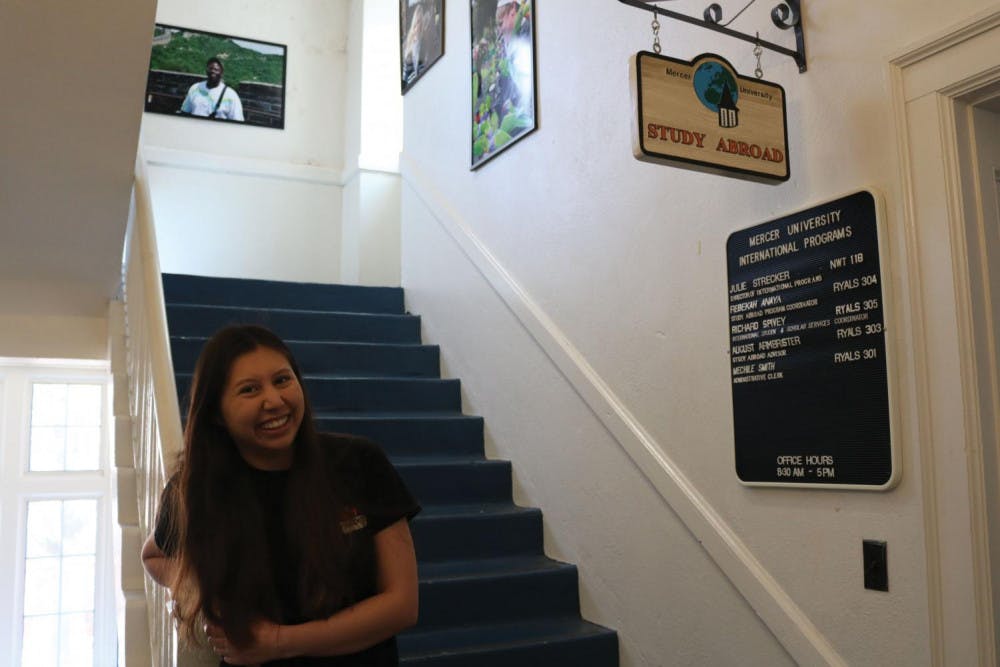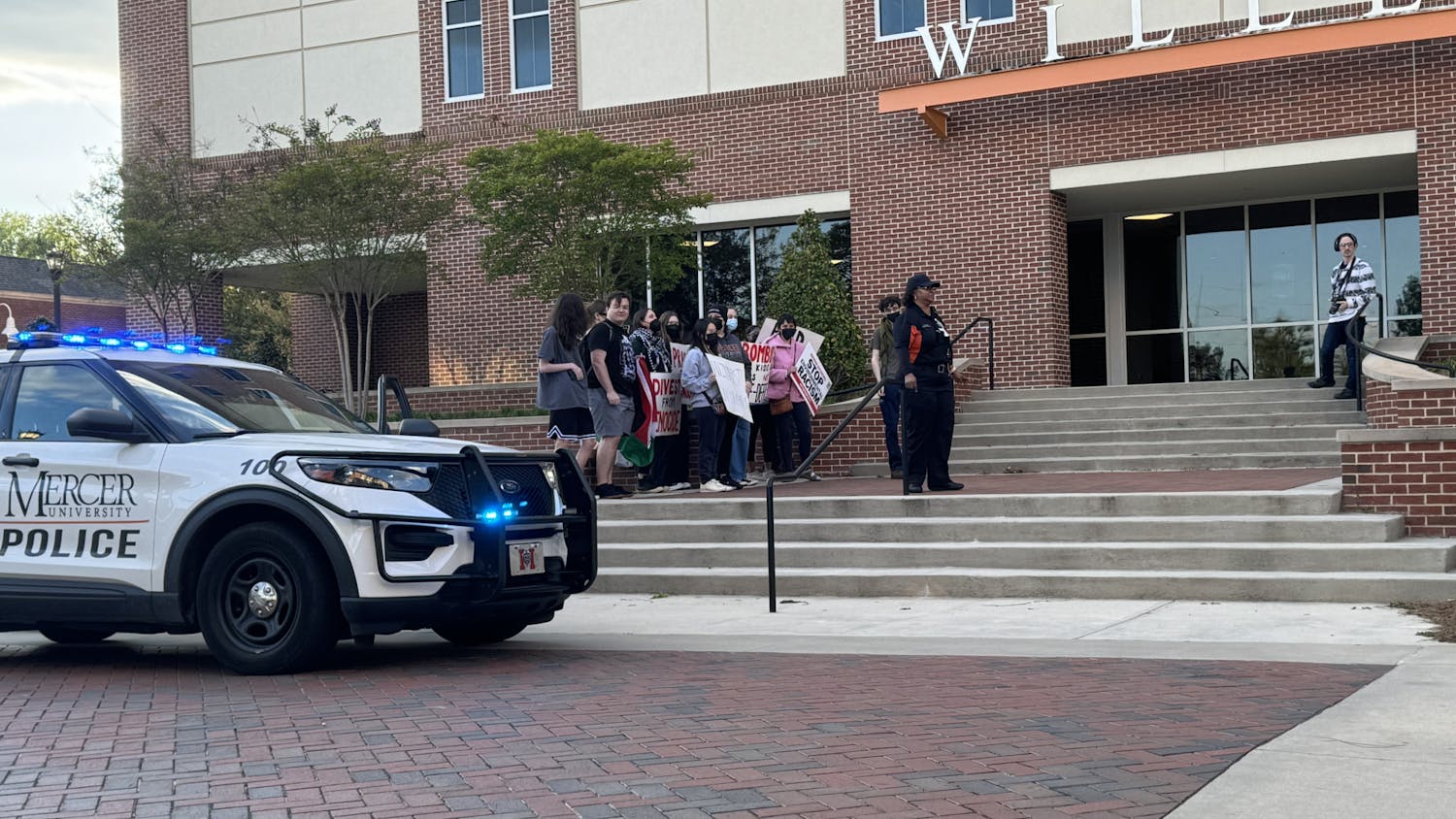During the spring semester, 25 Mercer students were studying abroad in countries near and far when the reality of COVID-19 set in.
As the pandemic sent schools into virtual learning and Mercer’s partner universities overseas sent their international students home, Mercer’s study abroad office had a logistical challenge on their plates.
“At that time, that was when it really geared up — where students are not sure what to do,” Study Abroad Advisor August Armbirster said. “That’s when it changed for me in my role, where my 8:30 to 5 turned into ‘I’m here for you when you need me.’”
The study abroad office was able to get all 25 students studying abroad back to the United State after the pandemic shut down schools across the world, Armbrister said, but it wasn’t without difficulty.
For example, the study abroad office had to coordinate with the Moroccan-American embassy, because a Mercer student and their father were stuck in Morocco after commercial flights were canceled, Study Abroad Coordinator Rebekah Anaya said. Another student reported being trapped in South Korea.
On top of that, three of the 25 students studying abroad at Mercer partner universities were unable to finish their semesters remotely as a result of the pandemic, Armbrister said. As a result, those students were set back a semester academically.
But as the study abroad office had to tackle the challenge of bringing all students home, Armbrister said, they had to orchestrate these students’ return back to the U.S. while working with students’ different time zones.
“That’s one of the big changes: making sure that we’re flexible with our schedules so that if they are in South Korea, in the UK, and they text and call us — they’re not going to have that call land on answering machine or a voicemail,” Armbrister said.
Overall, study abroad has been greatly impacted as a result of the coronavirus pandemic, Anaya said, halting most study abroad activity for almost an entire year.
Mercer canceled its semester-long programs at different universities internationally for the fall, various summer and fall recreational trips had to be canceled and faculty-led academic programs including Mercer on Mission had to largely be canceled as well, Armbrister said.
A few of those study abroad classes this summer, however, still went forward, Anaya said.
For instance, a study abroad class to Greece still happened. But instead of physically going to Greece, a travel guide on the ground made videos showing the sites they would normally see.
“It’s not the same as being in-person, but it was a nice alternative since we weren’t able to actually go,” Anaya said.
Despite the fact that studying abroad had to come to a halt, Anaya said that this is not the first time that the study abroad office has had to deal with difficult logistical matters.
The study abroad office has developed some tools to deal with the challenges posed by COVID-19, since they’ve had to do somewhat similar things in the past.
“Study abroad in general is used to dealing with crises across the world because we deal in locations all over the world,” Anaya said. “When Zika happened, when Ebola happened, when there is civil unrest, we keep a careful eye on all that.”
Anaya said that the study abroad office looks at the State Department travel registry to gauge the safety of sending students overseas.
The registry ranks countries safety levels as a one, two, three or four. One and two are where most study abroad programs at Mercer are as those are the two safest levels, Anaya said. On occasion, Mercer will send students to countries that rank as a three, but that is primarily for Mercer on Mission. Level four is a do not travel order.
As the pandemic ramped up, the state department increased ratings everywhere to a level four, Anaya said.
“We tend to take that pretty seriously,” she said.
Due to the spread of coronavirus, the State Department travel safety registry currently ranks most countries as a three, which suggests individuals reconsider travel. But Anaya said that she checks the guidance “pretty daily” to see how the state department’s guidance and many travel restrictions imposed on the U.S. are changing.
The ban on travel from many other countries means that faculty-led programs can’t move forward, Anaya said. But students studying at Mercer’s partner universities are allowed to enter most countries, with most having to undergo a two-week quarantine period.
With these restrictions constantly changing, the study abroad office is approaching future study abroad plans on the assumption that they will take place as usual, Armbrister said. He noted that their sign-up for their partner university programs are comparable to last year.
“It’s pleasantly surprising to see how many people are still interested in studying abroad — both students and faculty,” Anaya said. “Because everyone being in the same place for so long, people are itching to go overseas.”
That being said, they are taking precautions, like enrolling students who are set to study abroad at a different institution abroad in Mercer classes so they are not out of luck in the event they get canceled, Armbrister said.
“Right now, we are trying to adjust and make dreams that students have had for a really long time happen,” Armbrister said. “Make sure they happen, but happen safely.”
Study abroad office grapples with changing restrictions, pandemic

Lisa Fortin, a study abroad ambassador for Mercer’s study abroad office, poses for a picture under the “Study Abroad” sign in Ryals Hall in February.




